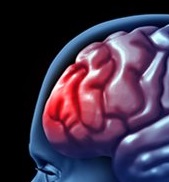A stroke is a medical emergency that occurs when the blood supply to a part of the brain is suddenly reduced, preventing that part of the brain from getting oxygen and other nutrients from the blood.
Your brain needs a continuous supply of oxygen and nutrients from blood supplied by your arteries. Without oxygen or nutrients, your brain cells will die (infarct), and the affected area can suffer permanent damage.
Two main reasons for reduced blood supply are a blood clot or a bleed.
Key facts
- A stroke occurs when your brain can’t get enough oxygen and essential nutrients, usually because a blood clot or sudden bleed reduces blood supply.
- Signs of a stroke include a drooping face, difficulty moving your arms, or slurred speech.
- If you notice signs of a stroke, call triple zero (000) immediately since any delay may lead to permanent brain damage or death.
- Managing risk factors such as high blood pressure and cholesterol, eating healthily, and exercising to reduce your chance of stroke.
Causes Of a Stroke
High blood pressure. Your doctor may call it hypertension. It’s the most significant cause of strokes. Your doctor will discuss treatments with you if your blood pressure is typically 140/90 or higher.

Tobacco. Smoking or chewing it raises your odds of a stroke. Nicotine makes your blood pressure go up. Cigarette smoke causes a fatty buildup in your main neck artery. It also thickens your blood and makes it more likely to clot. Even secondhand smoke can affect you.
Heart disease. This condition includes defective heart valves and atrial fibrillation, or irregular heartbeat, which causes a quarter of all strokes among the elderly. You can also have clogged arteries from fatty deposits.
Diabetes. People with it often have high blood pressure and are more likely to be overweight. Both raise the chance of a stroke. Diabetes damages your blood vessels, which makes a stroke more likely. If you have a stroke when your blood sugar levels are high, the injury to your brain is more significant.
Weight and exercise. Your chances of a stroke may go up if you’re overweight. You can lower your odds by working out every day. Take a brisk 30-minute walk, or do muscle-strengthening exercises like pushups and working with weights.
Medications. Some medicines can raise your chances of stroke. For instance, blood-thinning drugs, which doctors suggest to prevent blood clots, can sometimes make a stroke more likely through bleeding. Studies have linked hormone therapy, used for menopause symptoms like hot flashes, with a higher risk of strokes. And low-dose estrogen in birth control pills may also increase your odds.
Age. Anyone could have a stroke, even babies in the womb. Generally, your chances go up as you get older. They double every decade after age 55.
Family. Strokes can run in families. You and your relatives may share a tendency to get high blood pressure or diabetes. Some strokes can be brought on by a genetic disorder that blocks blood flow to the brain.
Gender. Women are slightly less likely to have a stroke than men of the same age. However, women have strokes at a later age, which makes them less likely to recover and more likely to die as a result.
For more information about strokes, please visit.
[DISPLAY_ULTIMATE_SOCIAL_ICONS]
